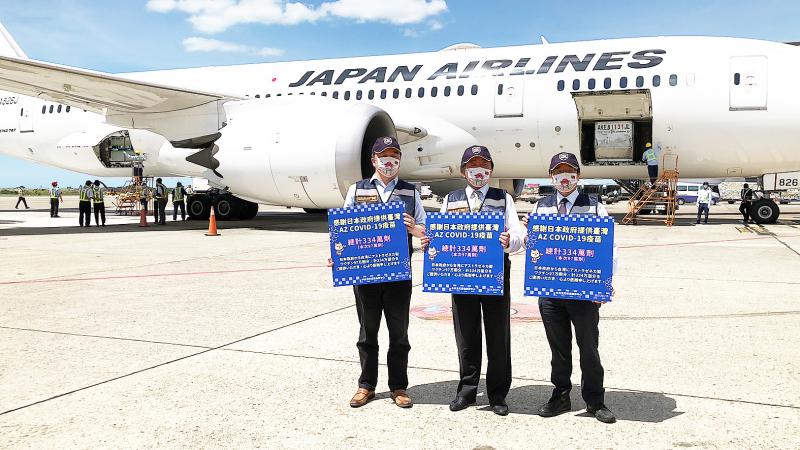Taiwan yesterday received three shipments of COVID-19 vaccines, a total of 1.88 million doses.
The nation has so far received 8.92 million doses of the AstraZeneca and Moderna vaccines.
First to arrive was a donation from Japan. A Japan Airlines Co flight arrived at Taiwan Taoyuan International Airport at about 1:45pm with 970,000 doses of the AstraZeneca vaccine on board.

Photo: CNA
Minister of Health and Welfare Chen Shih-chung (陳時中), who heads the Central Epidemic Command Center (CECC), and center officials Wang Pi-sheng (王必勝) and Chou Jih-haw (周志浩) greeted the flight holding signs thanking the Japanese government for its latest donation.
Japan has donated a total of 3.34 million doses of the AstraZeneca vaccine to Taiwan. The first batch of 1.24 million doses was delivered on June 4, while a second batch of 1.13 million doses arrived on Thursday last week.
Japan’s three donations would cover about 15 percent of Taiwan’s population, and are a tremendous help in the nation’s fight against COVID-19, Chen said at the airport.
“We are very grateful,” he said, before thanking the Japanese government and people once again for their friendship toward Taiwan.
A second shipment arrived at the airport at about 3:15pm.
The China Airlines Ltd (中華航空) flight, which flew in from Thailand, delivered 560,000 doses of the AstraZeneca vaccine — ones purchased by the government.
Taiwan signed a contract with AstraZeneca PLC for 10 million doses on Oct. 30 last year — this was the third delivery, the center said.
The first delivery of 117,000 doses arrived on March 3, while the second delivery of 626,000 doses arrived on Wednesday last week.
Yesterday’s final shipment of vaccines arrived at the airport at about 4pm. The China Airlines flight, which flew in from Luxembourg, arrived with 350,000 doses of the Moderna vaccine.
Taiwan signed a contract with Moderna Inc for 5.05 million doses, the center said.
With yesterday’s shipment — the fourth delivery — the nation has so far received 1.15 million of the doses, it said.
The first delivery of 150,000 doses arrived on May 28, followed by 240,000 doses on June 18 and 410,000 doses on June 30.
As of 5pm yesterday, 7.58 million people had registered online to get vaccinated against COVID-19: 2.5 percent chose the AstraZeneca vaccine, 55.19 percent chose Moderna and 42.31 percent said they would accept either vaccine, the center said.
As of Wednesday, 4,337,272 COVID-19 vaccine doses had been administered — 4,242,075 first doses and 95,197 second doses, CECC data showed.
Additional reporting by CNA

MAKING WAVES: China’s maritime militia could become a nontraditional threat in war, clogging up shipping lanes to prevent US or Japanese intervention, a report said About 1,900 Chinese ships flying flags of convenience and fishing vessels that participated in China’s military exercises around Taiwan last month and in January last year have been listed for monitoring, Coast Guard Administration (CGA) Deputy Director-General Hsieh Ching-chin (謝慶欽) said yesterday. Following amendments to the Commercial Port Act (商港法) and the Law of Ships (船舶法) last month, the CGA can designate possible berthing areas or deny ports of call for vessels suspected of loitering around areas where undersea cables can be accessed, Oceans Affairs Council Minister Kuan Bi-ling (管碧玲) said. The list of suspected ships, originally 300, had risen to about

DAREDEVIL: Honnold said it had always been a dream of his to climb Taipei 101, while a Netflix producer said the skyscraper was ‘a real icon of this country’ US climber Alex Honnold yesterday took on Taiwan’s tallest building, becoming the first person to scale Taipei 101 without a rope, harness or safety net. Hundreds of spectators gathered at the base of the 101-story skyscraper to watch Honnold, 40, embark on his daredevil feat, which was also broadcast live on Netflix. Dressed in a red T-shirt and yellow custom-made climbing shoes, Honnold swiftly moved up the southeast face of the glass and steel building. At one point, he stepped onto a platform midway up to wave down at fans and onlookers who were taking photos. People watching from inside

Japan’s strategic alliance with the US would collapse if Tokyo were to turn away from a conflict in Taiwan, Japanese Prime Minister Sanae Takaichi said yesterday, but distanced herself from previous comments that suggested a possible military response in such an event. Takaichi expressed her latest views on a nationally broadcast TV program late on Monday, where an opposition party leader criticized her for igniting tensions with China with the earlier remarks. Ties between Japan and China have sunk to the worst level in years after Takaichi said in November that a hypothetical Chinese attack on Taiwan could bring about a Japanese

The WHO ignored early COVID-19 warnings from Taiwan, US Deputy Secretary of Health and Human Services Jim O’Neill said on Friday, as part of justification for Washington withdrawing from the global health body. US Secretary of State Marco Rubio on Thursday said that the US was pulling out of the UN agency, as it failed to fulfill its responsibilities during the COVID-19 pandemic. The WHO “ignored early COVID warnings from Taiwan in 2019 by pretending Taiwan did not exist, O’Neill wrote on X on Friday, Taiwan time. “It ignored rigorous science and promoted lockdowns.” The US will “continue international coordination on infectious